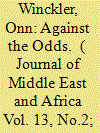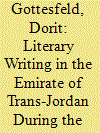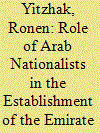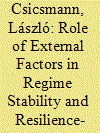|
|
|
Sort Order |
|
|
|
Items / Page
|
|
|
|
|
|
|
| Srl | Item |
| 1 |
ID:
188648


|
|
|
|
|
| Summary/Abstract |
Following independence, but particularly following the 1948–1949 Arab-Israeli War and more so in the wake of the assassination of King Abdullah I, a common prediction among both intelligence units and academics was that Jordan, at least in its initial form, namely as a sovereign political entity under the rule of the Hashemite family, would have a limited lifespan. These pessimistic projections were largely intensified following the June 1967 War and the Black September events. In retrospect, despite the high volatility of the Jordanian economy since the mid-1980s, and more so following the Iraqi invasion of Kuwait, Jordan is currently not only more politically stable than most of the other non-oil Arab countries, but also its socioeconomic situation is better. The aim of this article is twofold: first, to examine the major socioeconomic challenges that the Kingdom had to deal with that led so many to evaluate that it would not survive; and second, to explore the core socioeconomic pillars that enabled Jordan to survive. The core question that remains is, in light of the current major challenges – namely, the continuation of the Coronavirus pandemic; the continuing presence of large number of Arab Spring refugees; the ongoing instability in Syria and Iraq; the Kingdom’s high unemployment rate; and above all, the persistence of the rapid population growth – will the current rentier system work well “enough to survive” or, if not, what will the political consequences of failure be?
|
|
|
|
|
|
|
|
|
|
|
|
|
|
|
|
| 2 |
ID:
188647


|
|
|
|
|
| Summary/Abstract |
Even before the Arab Uprising waves, the grievances of increased demands on services and subsidies, shifting economic policy, the deteriorating core-periphery relations between Amman and erstwhile major centers in the Jordanian hinterland (e.g., al-Karak, Maʿān, al-Ṭafilah) have all characterized one aspect of the delicate balance of power in the Hashemite Kingdom. This article will examine the nature of this deterioration, and how the monarchy has variously conceded to, repressed, and thereby withstood repeated protests emanating from the hinterlands. Finally, this article examines a case study of the city of Maʿān as a bellwether hub of popular protest in Jordan.
|
|
|
|
|
|
|
|
|
|
|
|
|
|
|
|
| 3 |
ID:
188649


|
|
|
|
|
| Summary/Abstract |
This article deals with the literature that flourished in Jordan during the reign of King Abdullah I. It shows that although Abdullah wanted his views and the values of his regime to prevail over literary writing, behind the scenes, an opposition literature grew that undermined these values. Oppositional messages were disguised using various artistic means and many works were published outside rather than inside Jordan. In the end, however, it seems that the regime still managed to impose its values, since up to the present, literary research has tended to ignore the works written during this early period, showing that writing in Trans-Jordan was not oppositional. This article fills this void by pointing to the buds of subversion as reflected in literature written at that time.
|
|
|
|
|
|
|
|
|
|
|
|
|
|
|
|
| 4 |
ID:
188646


|
|
|
|
|
| Summary/Abstract |
Since 1948, Jordan has hosted successive waves of refugees from neighboring states. Since the onset of a new refugee crisis in 2011, the evolution of Jordan’s humanitarian assemblage has provided opportunities for the marked expansion, institutionalization, and globalization of Islamic and Christian humanitarianism within Jordan. The level of international influence the Jordanian government has allowed during the crisis has helped facilitate greater religious privacy for local Islamic and Christian charitable actors to express their religious vision through their charitable work with refugees. The regime has responded by allowing, surveilling, and sometimes seeking to reshape such religious effervescence in its own image. These dynamics cannot be understood purely through the history of refugee hosting in Jordan but also as ongoing competition between the regime and other actors, particularly Islamists affiliated to its main opposition Muslim Brotherhood, over dīn al-millah, or everyday religious expression.
|
|
|
|
|
|
|
|
|
|
|
|
|
|
|
|
| 5 |
ID:
188644


|
|
|
|
|
| Summary/Abstract |
The article discusses the relations between Arab nationalists and Amīr Abdullah in the Emirate of Trans-Jordan in the crucial period from 1921–1924. The first connections between the two arose due to the desire of the Arab nationalists to realize their ambition of throwing the French out of Syria and establishing an Arab government there instead. The nationalists thought that they would be able to achieve their goals through Abdullah, who had come to Trans-Jordan from Hejāz. Thus, they supported, encouraged, and gave him political backing in Trans-Jordan. The backing that he received from the nationalists was one of the considerations that the British government took into account in deciding whether or not to give him power in 1921. For his part, Abdullah encouraged the Arab nationalists by giving them political positions and integrating them into the Reserve Force (the military force established by the British), and by ignoring their activities directed against the French in Syria. The co-option of pan-Arab nationalists into Trans-Jordanian politics confirms that Abdullah did not want to develop local nationalism in Trans-Jordan in the first years of his rule. Nevertheless, as the rift between Abdullah and the British grew wider due to Arab nationalist activity, this led the Amīr to have concerns for his political future and drove him to tighten his ties with London and abandon those he had with the nationalists. Abdullah made his final decision in 1924, when he severed ties with the Arab nationalists and expelled their leaders from Trans-Jordan. From that time forward, Abdullah linked his political fate to Britain, which became the political and military mainstay of the Hashemite family in Trans-Jordan (and later in Jordan).
|
|
|
|
|
|
|
|
|
|
|
|
|
|
|
|
| 6 |
ID:
188645


|
|
|
|
|
| Summary/Abstract |
This article aims to bring together the factors of resilience, regime stability, and foreign penetration into one research project based on the example of the Hashemite Kingdom of Jordan, which marked the one-hundredth anniversary of its statehood in 2021. Even though it exists in a neighborhood that is in turmoil, the Jordanian monarchy has managed to survive all the spillover effects from such regional conflicts. This study argues that external influences have played an increasingly significant role in political developments in Jordan since the beginning of the New World Order in 1989. Scholars of international relations often argue that foreign penetration may cause state vacuums like those that have arisen in Syria, Libya, Yemen, and Iraq. Yet, this has not been the case with other states in the Middle East. One important factor behind this resilience and regime stability is related to the behavior of foreign actors. With respect to the Hashemite Kingdom, the United States has historically been the main provider of state security. Nonetheless, at the same time the European Union (EU) has adopted a pragmatic view toward Jordan and its new resilience-building approach also helps to maintain the status quo. Moreover, the regional hegemons and swing states of the Middle East and North Africa (MENA) region do not have an interest in altering the existing order save for a few radical groups. The author argues that the convergence of the national interests of the major regional stakeholders also contributes to regime stability and that outside support has increased the resilience of its political system despite the growing frustrations of many of the country’s citizens.
|
|
|
|
|
|
|
|
|
|
|
|
|
|
|
|
|
|
|
|
|